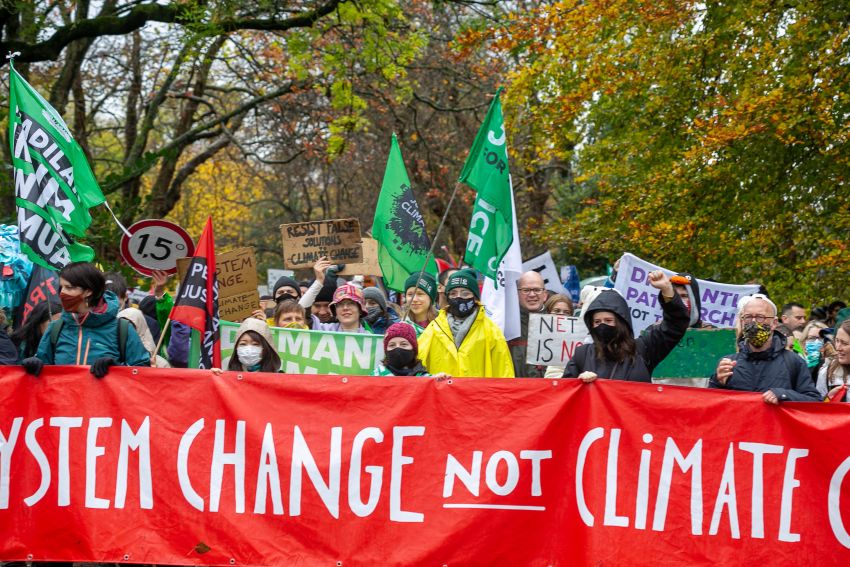
Climate science makes it clear we are running out of time to avoid climate catastrophe and this COP26 was vital in terms of achieving global agreement to act to limit overall climate heating.
It didn’t deliver what was needed.
It’s been an emotional roller coaster: normally leaders appear in the second week of negotiations but, this time, sensing the urgency, many leaders were on stage in the first few days, making a series of pledges, including:
• A deal to halt deforestation by 2030 (Australia signed on to this, although it won’t cover logging of native forests);
• A pledge by many nations to cut methane emissions by 30% by 2030 (Australia refused to sign); and
• Various pledges to assist “developing” nations (the Global South) to transition to clean energy while adapting to the impacts of climate change.
After huge community pressure, the Prime Minister finally caved to public opinion and announced a commitment to net zero emissions by 2050, shortly before the COP26 began.
At this COP, countries were expected to announce their emission targets for 2030. While it is widely agreed that emissions must plummet this decade if we are to even have a chance of staying close to the agreed goal of holding overall warming between 1.5°–2°C, Australia failed from the first day by refusing to promise more ambition than the paltry targets for 2030 announced years ago by former MP Tony Abbott (26-28% below 2005 levels).
Nations with similar economies went much further: for instance the United States committed to 50-52% below 2005 levels by 2030, while Britain promised 68% below 1990 levels.
Instead, Australia offered a plan to achieve net zero through “technology not taxes”, using “The Australian Way” catchphrase with a lot of vague claims and promises that rely on technology that does not even work yet.
When the federal government finally released its modelling showing how it had developed its plan, it was clear that it included no new policies. Instead, it relied on voluntary actions and government backing of technology to cut emissions.
Tim Baxter, a senior researcher at the Climate Council, said the report “may as well have been written in crayon” for its lack of substance.
Then the leaders mostly went home.
Big emitters, such as China and Russia, were criticised for not even showing up and large oil producers, such as Saudi Arabia, were accused of seeking to sabotage the talks.
The presence of a huge number of fossil fuel company representatives and the difficulties many civil society representatives had in gaining access to negotiations highlighted the difficulty of getting this global meeting to agree to targets based on the best available science.
A pleasing development was the Beyond Oil and Gas Alliance, an initiative founded by Denmark and Costa Rica, which aims to phase out oil and gas production.
France, Greenland, Ireland, Sweden and New Zealand joined the alliance, but Australia did not.
The second week of talks was dominated by talk about financing the “loss and damage” caused by over consumption of resources by rich Northern nations such as Australia.
A heartening development was the Just Energy Transition announcement in which South Africa will be supported to transition away from reliance on coal.
However, Southern nations have strongly criticised the lack of serious commitment to deal with loss and damage. The pact does not hold wealthy countries to specific financial commitments to help Southern countries.
The US and China’s surprise agreement to cut carbon emissions was a last-minute boost.
The summit closed with countries failing to agree on a call to “phase out” coal use, after a last-minute intervention by India which succeeded in watering down the language to “phase down”.
The commitments made failed to set the world on a path to reducing emissions by 45% by 2030 to stabilise the climate close to 1.5°C, but did close the gap to that trajectory.
In the final hours of the talks, civil society delegates walked out of the COP26 venue, to join with hundreds of movement activists that have been organising together on the outside.
The so-called Glasgow Climate Pact calls upon nations to phase out “inefficient fossil fuel subsidies” and recognises the need for “a just transition” from fossil fuels.
This sets a direction for our campaigning in coming months.
[The statement, released by Friends of the Earth Australia on November 15, has been slightly abridged.]